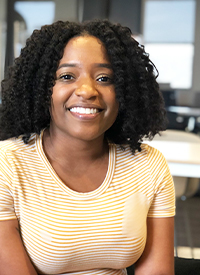by Tashi Copeland
Communications Manager

Tashi Copeland
If we’ve learned anything over the past year, it’s the power of sharing data and information. The COVID-19 pandemic has accelerated the rate at which new research and data from all over the world is shared to inform international and national responses to the pandemic and speed up the development of diagnostic tools, drug treatments and vaccines. Now a group of nine community foundations is taking a similar approach to closing the opportunity gap regarding systemic racism.
Role of Community Foundations
Community foundations have been a critical part of the philanthropic sector for generations in the United States. Community foundations build and strengthen communities by making it possible for a wide range of donors to participate in creating permanent funds to meet present and future needs. They have become catalysts to improvements through philanthropy that is visionary, diverse and inclusive.
Community foundations also have a role in the time of crisis. Whether it was the San Francisco Foundation creating a plan for not-for-profits during the earthquake of ’89 or The New York Community Trust establishing a fund for 9/11, community foundations are there to rebuild the community in times of crisis.
The murders of Breonna Taylor and George Floyd, coupled with the pandemic’s racial disparities, led to a racial reckoning throughout this country. With this reckoning happening nationwide, nine foundations came together with a commitment— to dismantle structural and systemic racism and to achieve equity in social and economic mobility—by creating Nexus for Equity + Opportunity Nationwide (NEON). This aligned action network group hopes that they can generate nationwide progress and garner philanthropic support from the country’s most notable donors and private foundations. CICF president and CEO Brian Payne served on the original design task force with five other executives from throughout the country.
NEON members include Central Indiana Community Foundation (CICF); Cleveland Foundation; Hawaii Community Foundation; Lincoln Community Foundation; Seattle Foundation; and Silicon Valley Community Foundation. In addition, three Connecticut grantmakers — the Fairfield County’s Community Foundation, Hartford Foundation for Public Giving, and the Community Foundation for Greater New Haven have joined forces to represent a commitment as one team.
A Network of Changemakers
All the members of NEON are also members of the Community Foundation Opportunity Network, a group of 45 community foundations that first came together in 2016 to find ways they could ensure that children living in poverty had the same chances of success as children of more affluent families. The Community Foundation Opportunity Network was in the process of establishing a group of foundations to compare notes on methods they used to close the opportunity gap when the pandemic hit. When it became clear that the pandemic was having a greater toll on people of color, the group decided that the challenges in closing the opportunity gap were directly linked to racism in America. Initially, the group has prioritized two systems: Power & Leadership and Income & Wealth.
“No single foundation has all the answers to dismantle systemic racism. And one size does not fit all. It’s truly going to take a collaborative effort for us to become an equitable, multi-cultural, anti-racist nation.”
Methods & Measures
The needs of communities change over time, and the solutions and methods community foundations use to address these needs change as well. What is a successful approach for one community foundation may not be appropriate at another as our foundations grow and evolve to meet changing situations and needs of their communities. Those familiar with the philanthropic world know that a common struggle for both foundations and investors is measuring the effectiveness of grants and investments. That’s why NEON is taking an agile approach to the work.

Brian Payne
“The aligned action network approach enables all members nationally to share research, best practices and measurement tools while allowing each community foundation to create the local partnerships and navigate local ecosystems for individual community success,” said Brian Payne, president and CEO of CICF and president of The Indianapolis Foundation.
The idea is that not that other foundations simply replicate the programs developed by the members of NEON. Instead, using a shared set of measurements and goals, other foundations will be able to adapt their approach and tailor it to their specific community.
“No single foundation has all the answers to dismantle systemic racism,” said Payne. “And one size does not fit all. It’s truly going to take a collaborative effort for us to become an equitable, multi-cultural, anti-racist nation.”
Building Equity and Changing the Narrative
Collaboration. Diagnostics. Reimagination. These are the key elements scientists have used to progress us forward this far during the uncharted territory of the COVID-19 pandemic. NEON is using those same elements, in addition to a focus on changing the narrative, to move us toward another unprecedented feat in history—a time in which everyone has the opportunity to reach their full potential, no matter their place, race or identity.






Leave A Comment